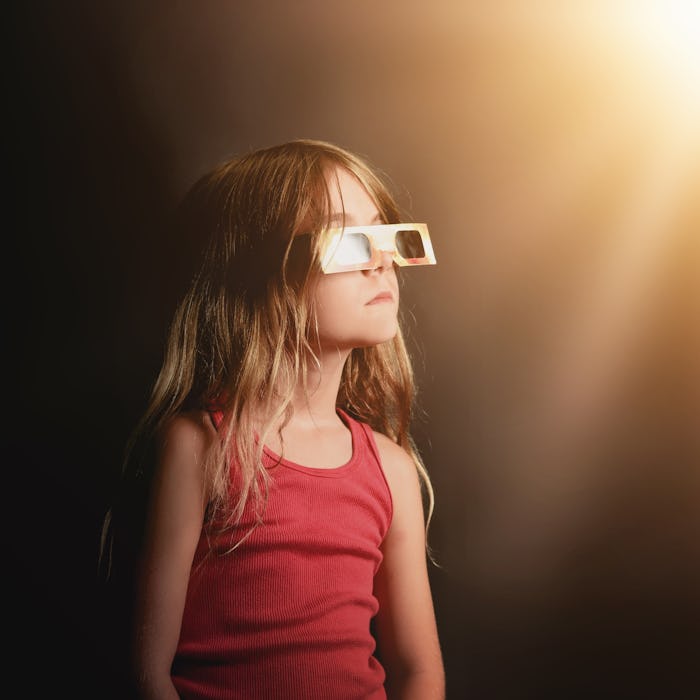Life

What Happens If Kids Look Directly At A Solar Eclipse? Experts Explain
The much-anticipated solar eclipse is just a few days away, and excitement is building palpably (even my grocery store clerk eagerly asked me this week if I'd be watching), I hope to, but I'm concerned about my three kids and their eye safety. Life is busy enough as it is, do I really need to order those specialized goggles for everyone? What happens if kids look directly at a solar eclipse? It turns out, it's more dangerous than I initially thought.
According to Dr. Lucy Chen, a Pediatric Ophthalmologist in Morristown, New Jersey, "The solar eclipse can cause burns to the many layers of eye tissues including the cornea, lens, and retina, although it's damage to the retina that is the most visually consequential."
If you're anything like me, you might need a brush-up on your eye anatomy. The retina is the delicate layer of nerve tissue that captures light and images and transmits them to the brain. When the sun's rays goes through the eye, it goes through the lens to the retina. In an exclusive interview with Romper, Chen explains, "Damage from viewing the solar eclipse is caused by infrared and UV radiation and excessive blue light. There is no risk to the eye when the eclipse is complete but any visible crescent of the sun behind the moon can cause solar damage to the eye that can result in permanent loss of vision, even blindness."
That's pretty scary stuff, but what's worse is that our kids face the biggest risk. Dr. Alan Mendelsohn, an Opthamologist in Hollywood, Florida, tells Romper that this is because, "When the sunlight rays go through the eye, it goes through the lens to the retina. The lens in children is clear. So the light rays zoom straight through and charbroils the back of the eye. While in contrast, as we age, the lens starts to become grey and cloudy, so the light from the eclipse is partially blocked and causes less damage than in a younger person."
Since the retina doesn't have nerve fibers, there is no way to feel the damage being done until after your vision has already been impaired. Mendelsohn's recommendations for safely watching the solar eclipse with kids are to either order special glasses that conform to the industry standard ISO 12312, or to simply stay indoors and watch on the computer or TV. Sunglasses offer no protection from a solar eclipse, Mendelsohn notes.
There's no reason why you or I can't enjoy this spectacular experience with our kids, as long as we do it safely. On Aug. 21 you can find my boys and I in the corn fields of Iowa, ready and waiting — with ISO 12312 glasses on.